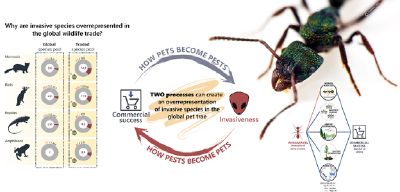Using digital data to understand and monitor emerging wildlife markets

SémIDEEV
24/05/2024
12:00:00
Jérôme Gippet, Dept of Ecology and Evolution, University of Lausanne, Switzerland
IDEEV - Salle Rosalind Franklin
Wildlife trade is one of the main drivers of the ongoing biodiversity crisis and a constant threat to global health. Over the past 20 years, the rise of the Internet has profoundly revolutionized most aspects of human activity, including wildlife markets.
In just a few years, the ability to advertise, trade and buy wild animals and plants on a global scale has become accessible to everyone, and the diversity of taxa traded has skyrocketed as a result. But regulation and monitoring are still lagging behind this digital revolution and new, unregulated and unmonitored wildlife markets are emerging at an alarming pace, especially for easy-to-ship taxa such as invertebrates. On the other hand, the shift to digital platforms has made wildlife markets theoretically easier to access and monitor. For many markets, commercial information on traded species is now accessible from anywhere in the world with just a few clicks or lines of code. The digitization of wildlife markets therefore offers an unprecedented opportunity to open a global, almost completely transparent window on the drivers and potential consequences of the wildlife trade.
In this seminar I will explore the potential of digital data to understand and monitor emerging wildlife markets.
In a first part, I will use the online trade in ants as pets as a model system to uncover a vicious circle in the wildlife trade, by showing that the pet trade not only triggers biological invasions, but that ecological traits associated with greater invasiveness also increase the likelihood of being traded as pets.
In a second part, I will briefly expose several projects where I collected and compiled digital data to monitor, predict and understand wildlife markets and their potential consequences for biological invasions and the spread of zoonotic pathogens.
Overall, I hope to paint an exciting picture of the potential of digital data to detect and monitor unsustainable human activities, but also of its underappreciated value for better understanding fundamental aspects of human-nature interactions.
To attend the seminar remotely : https://universite-paris-saclay-fr.zoom.us/j/95378291761?pwd=bmFuVENwb1hueFBNRUZGTzdrVE9CUT09 Meeting ID: 953 7829 1761 Passcode: 567909
For more information about Jérôme’s research : https://wp.unil.ch/bertelsmeiergroup/lab-members/jerome-gippet/ .
If you would like to meet Jérôme before or after the seminar, please contact Ivan Jaric in advance.